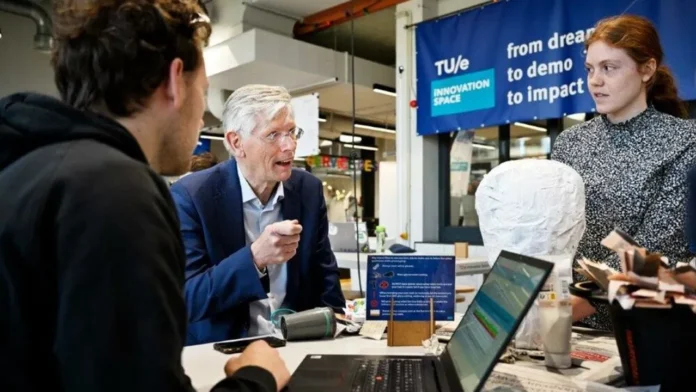Frank Baaijens bids farewell as rector of the Eindhoven University of Technology on Thursday. University magazine Cursor highlights Baaijens’ eventful period as TU/e-rector.
Corona crisis
Baaijens had eight eventful years as rector. The greatest challenge he faced was undoubtedly the corona crisis, which meant teaching had to take place online temporarily. Baaijens told Cursor that he was proud of the TU/e’s achievements during his time as rector.
“The first thought that occurred to me then was that we had to cope with the crisis until the new academic year in September (teaching on campus continued online as early as 23 March 2020, ed.). But when I found the scientific models, I quickly saw that it was not over just like that,” says Baaijens.
First to address the issue
“As one of the first universities to close its doors. That was the right decision. We didn’t do strange things; on the contrary, we always looked for where we could responsibly give space to research and to our students,” the rector said. “During that time, for example, we put more yellow picnic tables outside. I think the TU/e as a whole did an impressive job in getting education online so quickly.”
Vacancies for women
Apart from the corona crisis, the Irène Curie Fellowship programme, which the rector introduced in 2019, also caused a stir at the university and beyond. “I did expect that the measure of allowing only female candidates to apply for vacancies for the first six months would cause a fuss, but not that it would go all over the world,” Baaijens commented. “I thought Cursor would pick it up and then call the Eindhoven’s Dagblad, but it went viral. Even my acquaintances from Harvard spoke to me about it.”
Baaijens does not regret the initiative. “I would do it again in a minute, it has been successful. Fifty per cent of the new academic staff are now women. There are many internationals among them, so the diversity in culture and colour is also increasing indirectly. We don’t need a special programme for that.” In general, too, Baaijens says he is satisfied with the quality of education offered in Eindhoven.
Attracting the right people
“De facto, it’s about attracting the right people. The quality of your education stands or falls with that. Then you have to think carefully about what you want to be strong in. I also think this is a great asset of this university that we still let our top scientists give lectures in the bachelor’s programme. They find that important themselves too,” Baaijens said.
Student-staff ratio
But the outgoing rector does not think it is realistic for TU/e to compete with, for example, large universities in the United States. “We have to work with a less favourable student-staff ratio than other top institutions. MIT in Boston, for example, has ten students per employee; at TU/e, the ratio is twenty to one. The level of personal attention we can give is not comparable.”
Money from The Hague
Although Baaijens does not see those ratios changing any time soon, he does hope that politicians in The Hague are willing to support the university in a jump in scale. “It would be wise to invest in a technical university, especially at this location in Brainport. If the money comes late, it will slow down growth. This is bad because the economic development of the Netherlands will then also slow down with it. The industry then has to bring in workers from abroad for longer.”
“Besides, we ourselves cannot find students domestically either. The government should also take action on that. If companies realise that they cannot find staff here, they may go elsewhere.”
Sabbatical in Harvard
Baaijens will hand over his position to his successor Silvia Lenaerts on Thursday. After that, the outgoing rector will take a short sabbatical to Harvard. Afterwards, he says he will return to TU/e as usual. “At Harvard, I mainly want to see how medical technology and the medical sector interact there. After all, TU/e also wants to strengthen further the cooperation with the Catharina Hospital and the Maxima Medical Centre.”
“After that, I will return to my faculty, Biomedical Engineering. There I will be working on regenerative medicine again,” Baaijens concludes.
Source: Studio040.nl
Translated by: Anitha Sevugan
















